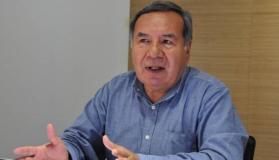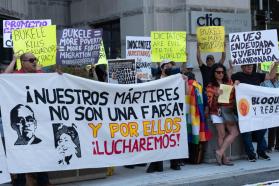US Intervention in El Salvador’s Legislature Reflects Political Bias in Anti-Corruption Fight
Recent US interference in El Salvador’s domestic legislative processes has earned the rightful ire of the governing Farabundo Martí National Liberation Front (FMLN) party. US State Department pressure on the country’s Attorney General to pursue a political agenda through his handling of anti-corruption investigations and prosecutions has also heightened political tensions in the country.
On August 30, FMLN legislator Roger Blandino Nerio made a public denouncement to the Salvadoran press that the new US Ambassador to El Salvador, Jean Manes, was making individual phone calls to Salvadoran legislators to pressure them to remove a Salvadoran diplomat’s immunity. Blandino Nerio told journalists the US Ambassador’s phone calls were “an absurdity, a disrespectful interference in the country’s affairs.”
The diplomat in question is General Atilio Benítez, El Salvador’s current Ambassador to Germany who previously served as Vice Minister and then briefly as Minister of Defense during the Mauricio Funes administration (2009-2014). The Attorney General wants to open an investigation into Benítez’ involvement in an arms trafficking case that occurred during his tenure as Vice Minister and Minister of Defense. Several other military officials have already stood trial in this case; and, as part of that trial, an army colonel entered into a plea bargain in which he admitted guilt and accused Benítez of involvement in exchange for leniency and protection. Given that El Salvador’s Constitution provides immunity from prosecution for all diplomats, the Attorney General submitted a request that the Legislative Assembly create a Special Commission to study removing said immunity so an investigation against General Benítez could proceed.
But, according to legislators from the FMLN and Christian Democrat Party (PDC), the Attorney General’s request only filled three of the six requirements that the Supreme Court has laid out in order for a Special Commission to be created to consider removing diplomatic immunity. Legislators from most of El Salvador’s political parties voted against the original request and, without sufficient votes, it was denied and sent to the archive, though Salvadoran law would have still permitted the Attorney General to re-submit the request with additional evidence.
Blandino Nerio told CISPES he cannot take a position on whether General Benítez is innocent or guilty, but he affirmed that strong institutions require the consistent application of clear legal frameworks. The majority of El Salvador’s legislators appeared to agree with him when they first decided to send the Attorney General’s request to the archive. However, following the US Ambassador’s phone calls and a private meeting she had with legislators from the right-wing Grand National Alliance (GANA) party, enough legislators changed their position that the Special Commission was created in spite of the holes in the Attorney General’s request.
After Blandino Nerio denounced the US government interference, the US Embassy released a communique that, according to the FMLN legislator, “essentially confirmed in very diplomatic language that the Ambassador had, in fact, been pressuring legislators.” The communique stated that: “Embassy functionaries interact with different sectors of El Salvador’s government and civil society” in the areas of “improving security, expanding economic opportunities and strengthening the investment climate, and reducing corruption and promoting strong institutions.”
Over the past year, the US government has taken an increased interest in ostensibly supporting transparency measures; indeed, the 2016 Congressional appropriations for State Department programs in Central America condition funding on Guatemala, El Salvador, and Honduras taking steps to fight corruption, including prosecuting current and past government officials. But it is increasingly apparent that US involvement in anti-corruption efforts in El Salvador reflects a political bias against the FMLN. While the US government has taken an active interest in almost any accusation, whether substantiated or not, against functionaries from FMLN administrations, more than 150 cases of corruption from previous right-wing Nationalist Republican Alliance (ARENA) party administrations that were unearthed when the FMLN won the presidency in 2009 languish in the Attorney General’s file cabinets.

 "I am a CISPES supporter because continuing to fight for social justice and a more people-centered country means continuing the dream and sacrifice of thousands of my fellow Salvadorans who died for that vision.” - Padre Carlos, New York City
"I am a CISPES supporter because continuing to fight for social justice and a more people-centered country means continuing the dream and sacrifice of thousands of my fellow Salvadorans who died for that vision.” - Padre Carlos, New York City

